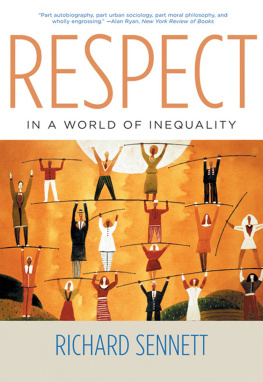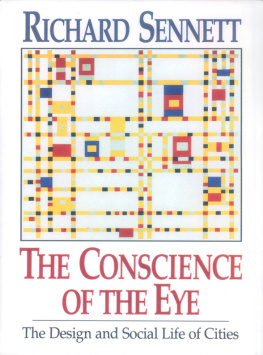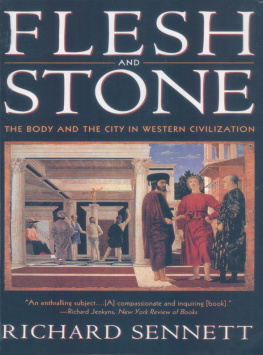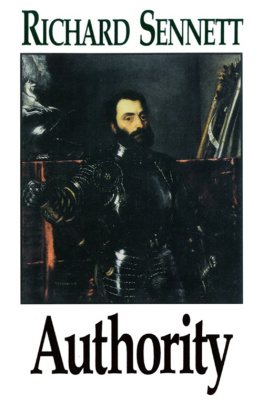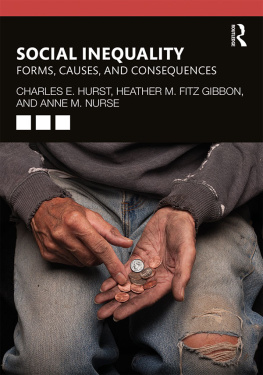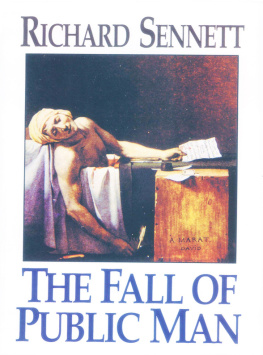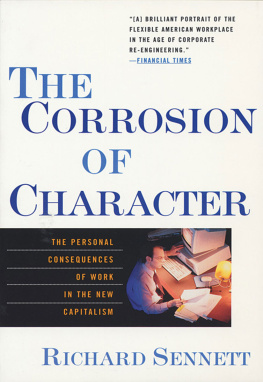W. W. Norton & Company
Sext and Muse des Beaux Arts from W. H. Auden: Collected Poems by W. H. Auden, edited by Edward Mendelson. Copyright 1937, 1940, 1951, 1952 and renewed 1965, 1968 by W. H. Auden. Reprinted by permission of Random House, Inc.
For information about permission to reproduce selections from this book, write to Permissions, W. W. Norton & Company, Inc., 500 Fifth Avenue, New York, NY 10110
Respect in a world of inequality / by Richard Sennett.1st ed.
p. cm.
Includes bibliographical references.
1. Public welfare. 2. Welfare recipientsPsychology. 3. Respect. I. Title.
W. W. Norton & Company, Inc., 500 Fifth Avenue, New York, N.Y. 10110
www.wwnorton.com
W. W. Norton & Company Ltd., Castle House, 75/76 Wells Street, London W1T 3QT
the growing good of the world is partly dependent on unhistoric acts; and that things are not so ill with you and me as they might have been, is half owing to the number who lived faithfully a hidden life, and rest in unvisited tombs.
Acknowledgments
I would like to thank Jean Starobinski for the example set by his writing, particularly Largesse (trans. Jane Todd, University of Chicago Press, 1997). Im grateful to suggestions from Victoria Glendinning on the uses of autobiography; and to discussions with Eric Klinenberg, Steven Lukes, Craig Calhoun, and Saskia Sassen about sociology. Niall Hobhouse argued with me from start to finish. Murray Perahia has corrected my memory. Alexander Nahamas at Princeton and Alan Ryan at Oxford arranged occasions to present parts of this book; I thank colleagues at both places for comments. Michael Laskawy and Chryssa Kanellak-Reimer helped me do research. Stuart Proffitt at Penguin and Alane Mason at Norton have proved patient and supportive editors.
Preface
Several years ago I wrote a book about work, The Corrosion of Character: The Personal Consequences of Work in the New Capitalism , and Id meant this book to be a companion volume about welfare. Welfare clients often complain of being treated without respect. But the lack of respect they experience occurs not simply because they are poor, old, or sick. Modern society lacks positive expressions of respect and recognition for others.
To be sure, society has a master idea: it is that by treating one another as equals we affirm mutual respect. However, can we only respect people who are equal in strength to ourselves? Some inequalities are arbitrary but others are intractablesuch as differences of talent. People in modern society generally fail to convey mutual regard and recognition across these boundaries.
The hard counsel of equality comes home to people within the welfare system when they feel their own claims to the attention of others lie solely in their problems, in the facts of their neediness. To earn respect, they must not be weak; they must not be needy.
When welfare clients are urged to earn self-respect, this usually means becoming materially self-sufficient. But in the larger society self-respect depends not only on economic standing, but on what one does, how one achieves it. Self-respect cannot be earned in quite the same way people earn money. And again inequality intrudes; someone at the bottom of the social order can achieve self-respect but its possession is fragile.
The relation between respect and inequality has become my theme. As I began writing out my thoughts, I realized how much it has shaped my own life. I grew up in the welfare system, then escaped from it by virtue of my talents. I hadnt lost respect for those Id left behind, but my own sense of self-worth lay in the way Id left them behind. So I was hardly a neutral observer; were I to write an honest book on this subject I would have to write in part from my own experience. Much as I like reading memoirs by others, however, I dislike personal confession.
So this book became an experiment. Its neither a book of practical policies for the welfare state nor a full-blown autobiography. Ive tried to use my own experience, rather, as a starting point for exploring a larger social problem.
Part One
Scarcity of Respect
Lack of respect, though less aggressive than an outright insult, can take an equally wounding form. No insult is offered another person, but neither is recognition extended; he or she is not seen as a full human being whose presence matters.
When a society treats the mass of people in this way, singling out only a few for recognition, it creates a scarcity of respect, as though there were not enough of this precious substance to go around. Like many famines, this scarcity is man-made; unlike food, respect costs nothing. Why, then, should it be in short supply?
Chapter One
Memories of Cabrini
The Housing Project
Early in the last century, poor American blacks began to escape the serfdom of the rural South by moving to cities up North. When the Second World War began, this tide of migrants swelled; both black women and black men found industrial work in the war factories, which gave the women an alternative to domestic service. In Chicago, my native city, whites were no better disposed to blacks than down South; the appearance of these new industrial laborers prompted immigrant Poles, Greeks, and Italians to move away from the blacks, even if they all had to work together. However, the citys planners sought to break white flight from neighborhoods in which blacks settled by building new housing in the middle of Chicago, reserving a certain number of places for the white poor. Cabrini Green was such a racially mixed enclave, and it was here that I spent part of my childhood.
In later years Cabrini became an emblem for all that was worst in public housingfull of drugs and guns, its lawns carpeted in broken glass and dog shit. But in the late 1940s, the architecture of this housing project would have seemed to an outsider simply dullplain long, low boxes without any softening ornament. The plumbing worked, the lawns were green, there were good schools nearby. Indeed, for blacks coming to Chicago, the future seemed bright, one observer later said of a project like ours; these cinder-block houses replaced the tar-paper shacks in which many people had lived in the South, the projects sending a signal that the larger society at last recognized their historic plight.
To the poor in Cabrini Green who were white, however, public housing sent a different signal.
Racial strife had a long history in Chicago; by the Second World War the authorities knew they had to address it. When Cabrini opened in 1942, the authorities proposed to the poor white: if you will live in the midst of blacks, we will take care of your rent. The war had created a housing shortage in the city, particularly of cheap housing. Like government planners before and since, the designers of Cabrini Green sought to remedy a large social evil in meeting that practical welfare need, using housing as a tool for combating racial segregation. It was not a tool they wielded directly; to my knowledge, none of the creators of Cabrini Green actually lived among us. Nor did the citys then small black bourgeoisie live here. I do not know if our neighbors were more or less racist than other whites. But whatever their views, they had become the servants of racial inclusion as imagined by a superior class.

